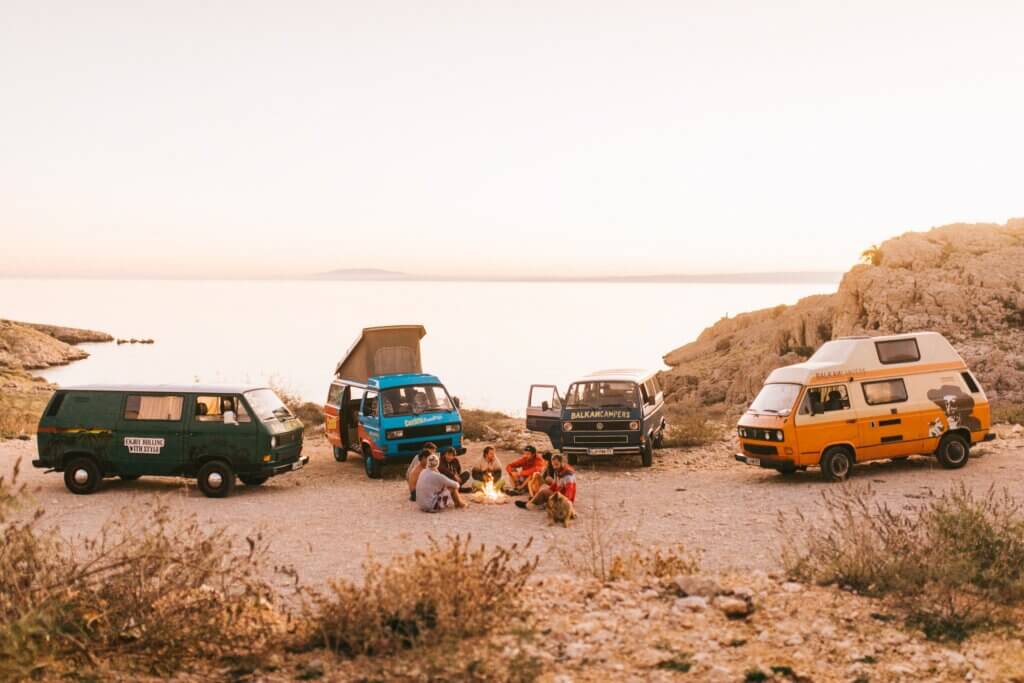Travel more responsibly by recreational vehicle

According to the latest news, teleportation is not for now ! So, to get around and go on vacation while respecting our planet as much as possible, there are solutions that are less polluting than others. In our last article, we told you about the exchange of recreational vehicles as a more responsible alternative to traveling abroad. Today, discover our tips for even more eco-friendly RV trips !
Choosing the right RV
If you want to reduce your carbon footprint as much as possible for your stays in RV, we advise you to think carefully when choosing it. Whether it is a purchase, a rental or an RV exchange, the model chosen will necessarily have an impact on your consumption. It will not be the same depending on whether you choose a van or a motorhome : the larger your RV is, the more fuel you will consume. Indeed, the weight, the height, the motorization and the age of the vehicle play a lot. And this affects the planet but also your budget ! To give you an estimation, it takes between 9 and 12 Liters for 100 kilometers for a motorhome.
For more eco-responsibility, it is better to choose a vehicle that corresponds exactly to your needs, especially with regard to the number of people participating in your trips. If you are traveling more as a couple, choose a model with a double bed. No need to go for more beds if you want to stay in a responsible logic. We also advise you, as far as possible, to opt for a recent model, which will be more up to standard and less polluting than an old model.
Manage your consumption
Save energy
As in your own home, small daily gestures allow you to better control the consumption of energy and resources. It’s up to you to set them up with your travel colleagues for a more ecological roadtrip ! Use water, heating and electricity only when it is absolutely necessary. You can favor cold dishes to avoid overusing your hotplates, for example. Also, if you’re a little cold in your RV, think about plaid and big socks so you don’t always turn on the heating…
Reduce your waste
The advantage of traveling by RV (and mainly if it is equipped with a kitchen area) is that you will be able to cook your own meals and use real cutlery. First of all, it’s much more pleasant to eat with real dishes, but it’s above all a way to avoid all disposable plastic, such as single-use forks, knives, spoons and glasses. If you want to go further, on the bathroom side you can also opt for reusable cottons, solid soaps and shampoos. For all cleaning products (to clean surfaces and dishes for example), use preferably rather biodegradable, natural and environmentally friendly products.
Moreover, at each stage of your journey, remember to respect the places you will visit. Take good care of picking up your garbage after your picnics, avoid altering the biodiversity, disturbing the local fauna and flora. Also be careful and pay attention to the selective sorting of the municipalities visited when you throw away your rubbish. From one country to another or from one city to another, waste recycling can be done differently so we recommend that you look at the city’s website or observe the logos on the containers.
Avoid overloading your RV
The heavier your RV is loaded, the more fuel it will consume. In addition to reducing your vacation budget, you will unnecessarily pollute the atmosphere. For example, we advise you to avoid overfilling your cupboards and your fridge with food : the purpose of a trip is also to consume locally ! You will have the opportunity to buy what you need once you arrive on site and enjoy the culinary specialties of the place visited. So, only take what you need for meals, to help you out, especially for the times you will be on the road. As a result, you will avoid repeated stops and restarts of your vehicle as well as the consumption of processed and imported products that are often found in service stations/rest areas. Same thing for your clothes and your personal effects : take only the essentials !
Practice economical driving
The way you drive has a direct impact on your fuel consumption and your greenhouse gas emissions. There are a few tips to improve driving behavior, we give you some of them :
● respect speed limits, or even drive at a lower speed
● anticipate climbs, descents, bends to maintain a stable speed and avoid braking and accelerating unexpectedly
● make sure that the tires are always well inflated, neither too much nor too little
● do not overuse the air conditioning or heating
And you, what are your tips for driving less fuel ?
Prioritize less polluting activities
Whether you go to the sea, to the mountains or to the countryside, the activities you practice can have an impact on the environment. If you really want to travel responsibly, we advise you to avoid activities such as jet skiing, first flights by plane or helicopter, boat tours or even quad rides. Opt instead for non-polluting activities such as cycling, surfing, hiking, rollerblading !
Adopt good practices during your trip
Slow tourism
The concept of slow tourism consists of traveling while taking your time, respecting nature and the inhabitants of the places visited. It is based on notions of moderation, short circuits and local consumption, benevolence, sharing… It means participating in the reduction of CO2 emissions and other pollutants by improving everyone’s knowledge through awareness and learning. It opposes mass tourism.
Plogging
The term first appeared in Sweden in 2016. It consists of taking advantage of your run to pick up litter encountered on your way. You can just as well pick up the waste while taking a walk with your children and thus make them aware of respect for the planet ! If you walk by the sea, you will probably be able to find a tidal bin available to deposit your collected waste. Before any walk, you can get into the habit of bringing a garbage bag and a small bottle of gel.
Responsible tourism also means avoiding gathering in the same places by finding out beforehand about the very touristy areas. You can make the more responsible choice of another destination for your holidays or simply go there at a time when it is less crowded.
Traveling eco-responsibly means of course respecting the places and not making excessive noise, not taking plants and not feeding animals !
If you own a recreational vehicle and want to opt for more responsible travel, SwapTheRoad offers you the exchange of RVs between individuals ! Sharing, benevolence and transparency, the values of the community ensure an authentic experience. Head over to SwapTheRoad to see all the RVs available for swapping around the world !


TO DISCOVER ALSO

Vanlife Expo: A must-see event for adventure and freedom enthusiasts
At the heart of the passion for freedom on wheels is an unmissable event in France: the Vanlife Expo.

Motorhome swap: report in the French TV show Capital
More than 1.8 million viewers tuned in to M6’s Capital to discover a new and fast-growing phenomenon: the exchange of leisure vehicles, a good deal that’s becoming increasingly popular!

Yupwego: flexible, comprehensive travel insurance for all your trips abroad
Discover Yupwego, the tailor-made insurance for all your trips abroad. Whether you’re away for a weekend or several months, enjoy personalized coverage and services tailored to your needs, so you can travel with peace of mind, wherever you are.

